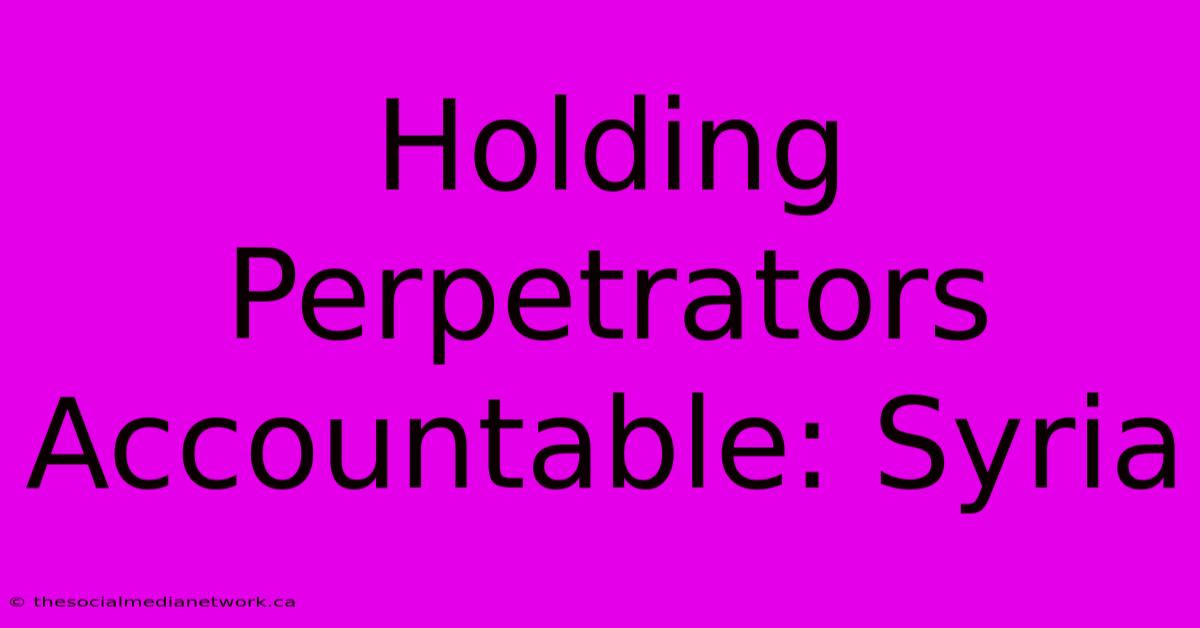Holding Perpetrators Accountable: Syria

Discover more detailed and exciting information on our website. Click the link below to start your adventure: Visit Best Website meltwatermedia.ca. Don't miss out!
Table of Contents
Holding Perpetrators Accountable: The Complexities of Justice in Syria
The Syrian conflict, a brutal decade-long war marked by widespread atrocities, demands accountability. Millions have suffered, and the international community grapples with the immense challenge of bringing perpetrators to justice. This article delves into the complexities of achieving accountability for the crimes committed in Syria, examining the obstacles and exploring potential pathways towards justice.
Understanding the Scale of the Atrocities
The Syrian conflict has witnessed horrific human rights violations on an unprecedented scale. These include:
- War Crimes: Targeting civilians, indiscriminate attacks, destruction of civilian infrastructure, and unlawful attacks on protected objects.
- Crimes Against Humanity: Widespread or systematic attacks against a civilian population, including murder, torture, rape, and persecution.
- Possible Genocide: Allegations of systematic attacks targeting specific groups, aiming to destroy them in whole or in part.
Examples abound, from the siege of Aleppo, where civilians faced starvation and bombardment, to the use of chemical weapons in Ghouta, resulting in mass casualties. The sheer scale and systematic nature of these crimes necessitate a robust and multifaceted approach to accountability.
Obstacles to Justice in Syria
The pursuit of justice in Syria faces significant obstacles:
- Ongoing Conflict: The active conflict hinders investigations, evidence gathering, and the safe return of refugees and internally displaced persons (IDPs) crucial for providing testimony.
- Political Obstacles: The lack of cooperation from the Syrian government and its allies, along with geopolitical divisions within the international community, hampers the establishment of effective international mechanisms.
- Weakened Legal Systems: The destruction of national infrastructure and the erosion of the judicial system within Syria limit domestic accountability efforts.
- Witness Protection Challenges: Ensuring the safety and protection of witnesses who are often still living in the conflict zone or in neighboring countries poses a significant threat.
The Assad regime's control over much of Syria also makes independent investigations and prosecutions extremely challenging. Many potential witnesses live in fear of retribution.
Pathways Towards Accountability
Despite these challenges, several pathways toward accountability are being explored:
- International Criminal Court (ICC): While Syria isn't a member of the ICC, the court has initiated an investigation into crimes committed in Syria since 2011. This relies on the principle of universal jurisdiction.
- National Jurisdictions: Several countries have initiated investigations and prosecutions based on the principle of universal jurisdiction, allowing them to prosecute individuals for crimes committed abroad, even if the perpetrator is not a citizen and the crime did not occur within their territory. Germany, France, and Sweden are examples of countries actively pursuing this route.
- International Hybrid Tribunals: Models like the Special Tribunal for Lebanon could potentially be adapted for Syria, combining international and national elements to increase effectiveness and legitimacy.
- Truth and Reconciliation Commissions: While not focused on criminal prosecution, these commissions can play a vital role in documenting past atrocities, providing a platform for victims to share their experiences, and contributing to national reconciliation. However, their efficacy depends heavily on political will and the cooperation of all parties.
The Role of the International Community
The international community has a critical role to play in supporting these efforts. This involves:
- Financial and logistical support: Providing resources for investigations, prosecutions, and witness protection programs.
- Diplomatic pressure: Utilizing diplomatic channels to encourage cooperation from states and actors involved in the conflict.
- Sanctions: Targeted sanctions against individuals responsible for atrocities can exert pressure for accountability.
Frequently Asked Questions (FAQs)
- Q: What is universal jurisdiction? A: Universal jurisdiction is a legal principle that allows states to prosecute individuals for serious international crimes, regardless of where the crimes were committed or the nationality of the perpetrator or victim.
- Q: Why is accountability in Syria so difficult? A: The ongoing conflict, political obstacles, the destruction of Syrian legal systems, and the difficulty of protecting witnesses all contribute to the complexities of achieving accountability.
- Q: What are some examples of successful accountability mechanisms in other conflicts? A: The International Criminal Tribunal for the former Yugoslavia (ICTY) and the International Criminal Tribunal for Rwanda (ICTR) serve as examples of international tribunals that successfully prosecuted perpetrators of atrocities. However, each context is unique, and the Syrian situation presents its own particular challenges.
The pursuit of justice for victims of the Syrian conflict is a long and arduous process. While significant hurdles remain, a multifaceted approach involving international and national mechanisms, coupled with sustained international support, offers the best hope for holding perpetrators accountable and contributing to lasting peace and reconciliation in Syria.

Thank you for visiting our website wich cover about Holding Perpetrators Accountable: Syria. We hope the information provided has been useful to you. Feel free to contact us if you have any questions or need further assistance. See you next time and dont miss to bookmark.
Featured Posts
-
Aussie Party Emergency Help
Dec 09, 2024
-
Kantersieg Fuer Rapid Ii Gegen Sv Horn
Dec 09, 2024
-
Chemical Weapons In Syria Uks Un Plea
Dec 09, 2024
-
Sjkc Name Zahids Request To Kpm
Dec 09, 2024
-
Thier Galerie Dortmund Schliessung Droht
Dec 09, 2024
